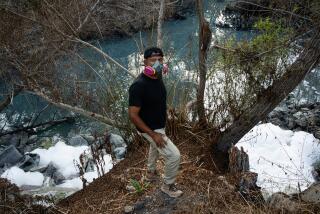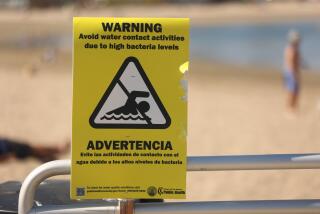Closures Highlight Risks of Contaminated Water
- Share via
HUNTINGTON BEACH — Recent raw sewage spills that have forced the closure of half a dozen beaches in Orange County highlight the health risks of swimming in water where sewer leaks or urban runoff can send bacteria levels soaring.
The most common ailments that can be contracted from swimming in fouled water range from such minor problems as eye irritation or a runny nose to a sore throat, earache, sinus infection, nausea, vomiting or diarrhea. Cuts or sores can also become infected. In extremely rare cases, an individual could be exposed to such diseases as hepatitis and salmonella.
If you’re feeling unwell after swimming at the beach, you should go to a doctor, said Orange County Public Health Director Dr. Hugh F. Stallworth. “And let your physician know you were in the water.”
Epidemiologists say the vast majority of Orange County swimmers won’t ever have a problem. But they suggest beach-goers avoid areas where repeated tests have detected high levels of human waste and bacteria, the most common being where creeks or storm drains feed into the ocean.
Swimmers should also avoid the beach for up to three days after a storm, which dumps urban runoff into the sea.
A study released last month by USC epidemiologist Robert W. Haile found that beach-goers who swim near storm drains are nearly 50% more likely to contract colds, diarrhea and other illness than those who swim farther away.
“There’s a health problem there for sure,” said Haile, who was assisted in the study by a virus expert from the Orange County Sanitation Districts. “But that doesn’t mean people should stay away from the water. They should just be cautious about where they go.”
Surfers and lifeguards have their own set of precautions to fend off potential health problems.
Capt. Steve Seim, who supervises 130 lifeguards at Huntington City Beach, said lifeguards are inoculated for hepatitis B and typically scrub down and use a disinfectant after coming out of the water. Cuts get extra attention.
Lifeguards who have no choice but to enter dirty water will frequently go to a clinic afterward for shots to ward off illnesses, Seim said.
Surfers frequently wear earplugs and avoid “duck diving”--a technique surfers use to dip under the waves while paddling out, which forces water into the nose and sinuses and can cause infections, said Dr. Gordon LaBedz, a Seal Beach surfer and physician who is also a founding member of the Surfrider Foundation.
LaBedz said surfers are taking a risk when they surf near storm drains or creek and river mouths, areas that surfers are attracted to because they improve the surfing conditions even as they dump urban runoff into the ocean.
Aside from carefully choosing a swimming spot, the second most important precaution is to avoid swallowing water, which is the most common way a swimmer can become exposed to potential illnesses, officials said.
“The best precaution to take is to stay out of the areas where there’s a continued problem,” said Dr. Donald Forthal, assistant professor of medicine at UC Irvine and director of the UCI Infectious Diseases Clinic. “Other than that, I wouldn’t be concerned.”
More to Read
Sign up for Essential California
The most important California stories and recommendations in your inbox every morning.
You may occasionally receive promotional content from the Los Angeles Times.











